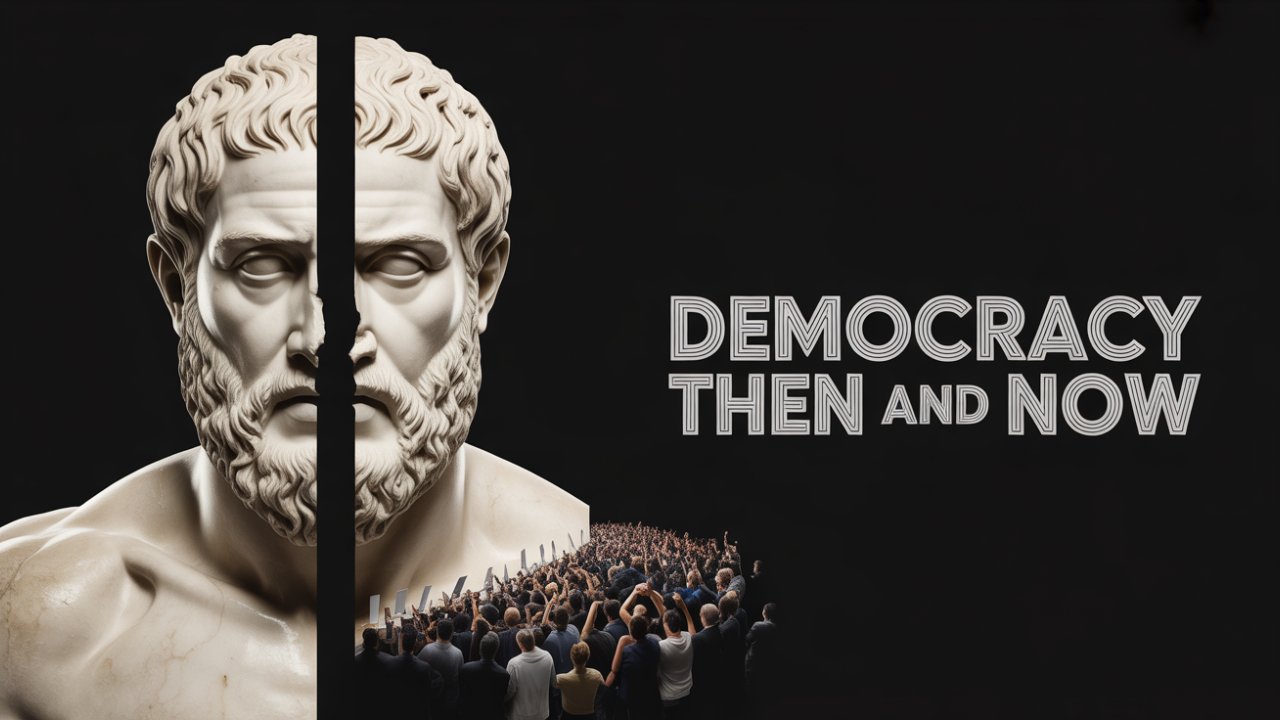Title: The Fascinating Journey Of Democracy
Democracy. It’s a word we think we know. A government ‘of the people, by the people, for the people.’ We see it in voting lines that snake around city blocks, we hear it in the passionate speeches of elected officials, and we feel it in the determined energy of protestors demanding change. It’s the system billions of us live under—the bedrock of the modern world.
But what if I told you that the founders of democracy in ancient Athens would look at our world and not see democracy at all? They might even call it a form of tyranny. They’d be baffled by our concept of human rights, utterly confused by our elections, and probably horrified by who we allow to participate. Their invention was something far more radical, far more direct, and in many ways, far more exclusive.
This is the story of how that wild, and often flawed, idea was born, how it was lost for nearly two thousand years, and then fought for all over again to become the system that shapes our lives. This is the fascinating journey of democracy.
Our journey begins not in some grand parliament building, but on a sun-drenched hill in Athens around the 5th century BCE. Here, a revolutionary experiment was unfolding. The name they gave it, Dēmokratía, tells you everything: ‘Demos,’ meaning ‘the people,’ and ‘Kratos,’ meaning ‘power.’ Power to the people. It sounds simple enough, but in a world run by kings, emperors, and hereditary nobles, it was an idea so bold it was almost nuts.
This wasn’t a slow-burn evolution; it was a political big bang, sparked by reformers who saw their society cracking under the pressure of inequality. The first key player was Solon, who, around 594 BCE, laid the groundwork by canceling debts and ending debt slavery, giving a voice back to citizens who’d been silenced by poverty. But it was Cleisthenes, often called the “father of Athenian democracy,” who really tore up the rulebook in 508 BCE. He completely reorganized society, deliberately smashing old family and tribal loyalties to create a new, powerful identity: the Athenian citizen.
Under leaders like Pericles, this system hit its stride. Athenian democracy was direct. There were no professional politicians as we know them. Instead, any eligible citizen could show up to the Ekklesia, an open-air assembly, to debate and vote directly on every single law, every declaration of war, and every budget decision. And get this: key government jobs weren’t filled by elections—which they worried would just become popularity contests—but by lottery. They saw this as true political equality; any citizen could be chosen to help run the entire city for a day. It was a government not of the best or the richest, but of the ordinary person.
But here’s where we hit the first, major catch: that “flawed ideal.” The Athenian definition of “the people” was shockingly narrow. Who was a citizen? Only adult, free-born males. This radical experiment in equality was built on a foundation of mass exclusion. Women, kept to the private sphere, had no political voice. Slaves, who powered the Athenian economy, were seen as property, not people. And foreigners, even families who had lived in Athens for generations, were locked out. Out of a population that might have been as high as 300,000, only about 30,000 to 45,000 men were actually citizens with the right to participate.
So while Athens gave the world the seed of a magnificent idea—that power should rest with the people—it was an incomplete, imperfect seed. The Athenians proved a state could work without a king, but their democracy was a members-only club. And as brightly as it burned, its flame was snuffed out. Torn apart by wars like the Peloponnesian War and overshadowed by the rise of powerful Macedonian kings like Philip II and his son, Alexander the Great, the great Athenian experiment collapsed. With its fall, the very concept of democracy went into a long hibernation.
With the fall of Greece and, later, the Roman Republic, the world entered an age of emperors, feudal lords, and the absolute authority of the church. For over a thousand years, the idea of ‘rule by the people’ wasn’t just impractical; it was unthinkable. Power, everyone understood, flowed down from God to a king, not up from the people. Your job wasn’t to govern, it was to obey.
But the idea didn’t vanish entirely. It survived in old texts and in the quiet resentment of people feeling the sting of absolute power. And the first major crack in the wall of monarchy appeared not in a university, but on a muddy field in Runnymede, England, in 1215.
A group of rebellious barons, sick of the tyrannical King John, cornered him and forced him to sign a document that would echo through the ages: the Magna Carta. Now, let’s be clear: the Magna Carta was not a democratic manifesto. It was mostly about protecting the privileges of the nobility. But in doing so, it established a game-changing idea: the king himself was not above the law. For the first time in centuries, a ruler’s power was officially limited by a piece of paper. It introduced the seeds of principles that would become democratic cornerstones, like the right to a fair trial and protection from being illegally thrown in jail.
That seed took a long time to grow. Over the next few centuries, the principle slowly expanded. In 1265, the first English Parliament was formed, bringing representatives together to advise the king, mostly about taxes. It wasn’t democracy, but it was the start of a representative system—an admission that a ruler needed some kind of consent to govern.
The path forward was slow and often bloody. But things were moving. The Habeas Corpus Act of 1679 gave people more protection from random imprisonment. Then, the Glorious Revolution of 1688 saw another king booted from the throne. The new rulers, William and Mary, had to sign the English Bill of Rights in 1689. This document was a turning point. It guaranteed regular parliaments, free elections (for the tiny fraction of men who could vote), and freedom of speech inside Parliament. In effect, it shifted power from the monarch to Parliament, creating a system where the law was finally king.
The long sleep was over. The idea of democracy wasn’t fully awake yet, but it was stirring, blinking in a world on the verge of massive change. The groundwork had been laid, not by destroying power, but by containing it with the rule of law. The stage was now set for the idea to come roaring back to life.
If the medieval period cracked the door open for democracy, the Enlightenment kicked it right off its hinges. This was an era of intellectual fireworks, where philosophers dared to question everything: the power of the church, the divine right of kings, everything. Thinkers like John Locke in England argued that government is a “social contract” between the rulers and the ruled, and that everyone has natural rights to life, liberty, and property. If a government breaks that contract, he said, the people have the right to ditch it. Over in France, Montesquieu pushed for a separation of powers—splitting government into branches—to keep tyranny in check. And Jean-Jacques Rousseau argued that the only legitimate government is one that follows the “general will” of its people.
These weren’t just dusty academic theories; they were intellectual dynamite. And they landed in very fertile ground. Across the Atlantic, American colonists, tired of being taxed and controlled by a British government where they had no voice, took these ideas and ran with them. The famous cry, “no taxation without representation,” was a direct echo of the principles from the Magna Carta and the English Bill of Rights. The American Revolution in 1776 was basically an Enlightenment project come to life. The Declaration of Independence is pure Locke, and the U.S. Constitution is a masterclass in Montesquieu’s theories of checks and balances.
But the Americans also made a critical tweak. The direct democracy of Athens just wasn’t possible in a huge, sprawling nation. So the Founding Fathers built a representative democracy—a republic. Citizens wouldn’t vote on every law themselves; they’d elect people to govern for them. This was the practical fix for the problem of scale, a blueprint that most modern democracies would follow.
Just a few years later, in 1789, that revolutionary spark leaped back across the ocean to France. The French Revolution was a much more violent and chaotic explosion of democratic ideals. It toppled a monarchy and an ancient aristocracy, declaring the universal principles of “Liberté, Égalité, Fraternité” — Liberty, Equality, and Brotherhood. Although the revolution spiraled into the Reign of Terror and eventually led to Napoleon, its ideals electrified the world. The age of the subject was ending; the age of the citizen had begun.
The 19th century became a slow, grinding fight to expand the definition of “the citizen.” At first, the right to vote in these new republics was still mostly limited to men with property. But the genie was out of the bottle. All through the century, movements pushed for more people to be included. France gave all men the right to vote in 1848. The U.S. got rid of property requirements for white men by the 1850s. And way over in the British dominions, Australia and New Zealand pioneered the secret ballot in the 1850s, a simple but vital tool to protect voters from being intimidated. The promise of democracy was slowly but surely starting to spread from the few to the many.
This incredible journey from a forgotten idea to a revolutionary force completely reshaped our planet. But the story is far from over. If you’re finding this journey as fascinating as I do, make sure to subscribe and hit that notification bell so you don’t miss our next deep dive into the ideas that define our world.
The 20th century saw democracy spread across the globe with stunning speed—but it also saw it face its most terrifying enemies. After World War I, empires collapsed and a wave of new democracies rose up across Europe. This era also saw one of the biggest expansions of rights in history: women’s suffrage. After decades of tireless struggle by suffragists, the vote was finally extended to women. New Zealand led the way in 1893, and major powers like the United Kingdom and the United States followed after the war, instantly doubling the number of voters and making their democracies far more representative.
But this democratic wave was met by a vicious undertow. The rise of fascism in Italy, Nazism in Germany, and communism in the Soviet Union offered powerful, authoritarian alternatives that hated everything democracy stood for. World War II became a global clash over these clashing ideologies. The Allied victory kicked off a second great wave of democratization. Germany and Japan were rebuilt as stable democracies. Then, as colonialism crumbled from the 1950s onward, dozens of new nations in Africa and Asia adopted democratic constitutions. The fall of the Berlin Wall in 1989 unleashed a third wave, as countries across Eastern Europe shook off communist rule. By the start of the 21st century, it looked like democracy had won.
And yet, the story doesn’t end with a simple ‘happily ever after.’ The journey into the 21st century has revealed a maze of new and complicated threats. In recent years, we’ve seen something called “democratic backsliding.” In many countries, both old and new, democratic norms are being quietly eroded. It’s not happening with tanks in the streets, but with the slow dismantling of institutions from within: attacks on the free press, the weakening of independent courts, and the manipulation of elections.
We’re facing challenges the ancient Athenians or 18th-century revolutionaries could never have dreamed of. The internet and social media, once seen as tools for liberation, have also become superhighways for misinformation that can poison public debate and drive us further apart. This makes the compromise needed for a healthy democracy feel almost impossible. At the same time, growing economic inequality is straining the social fabric, causing people to lose faith in the very democratic institutions that are supposed to serve them.
So, where does that leave us? The journey of democracy isn’t a straight line toward some perfect finish. It’s a messy, ongoing, and often frustrating struggle. It’s the story of a radical idea, born in a tiny, exclusive club in ancient Athens; an idea that was forgotten, rediscovered, and fought for in revolutions and parliaments, in street protests and at the ballot box.
The democracy we have today would be unrecognizable to Cleisthenes, a compromise that Locke might have applauded and Rousseau might have scorned. It’s our inheritance—a system passed down not as a finished monument, but as a project that’s permanently under construction. Its flaws, from the exclusions at its birth to the digital threats of today, are just as much a part of its story as its triumphs.
Ultimately, the story of democracy isn’t just about philosophers and presidents. It’s about the constant, collective effort to answer one of the hardest questions there is: how do we live together, fairly and freely? The journey is far from over. Today’s challenges aren’t a sign that democracy has failed; they are a call to action. They are simply the latest test in a 2,500-year-old experiment. And the next chapter is being written by all of us, right now.





